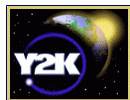As some people look forward to a new and brighter millennium, others prophesize about the Second Coming, or the apocalypse. While these prophecies may be ignored by many, they might not be too far off base. The year 2000 may not bring an end to the physical world; however, it may cause great havoc to the world's computing industry. The year 2000 problem (or "Y2K" as it is often referred to) is not really a bug or virus, but is a computer industry mistake.
Personal computers (PCs), mainframes, and software are not designed or programmed to compute a future year ending in double zeros ("00"). This is going to be a costly "fix" for the industry to absorb. In fact, Mike Elgan, editor of Windows Magazine, says, . . . the problem could cost businesses a total of $600 billion to remedy(Experts Elgan). Y2K has become a two-part problem.
One is the inability of the computer to adapt to the MM/DD/YY issue, while the second problem is the unwillingness of many people to see the impact it will have. Most IS (information system) specialists are either unconcerned or unprepared. In order to fix the year 2000 computer problem and its impact, one must fully understand what this problem is. Back in the 1960's, programmers decided to store the year of dates as two digits instead of four in order to save much needed space and cut costs. So the year "1998" would be stored as "98" and "2000" will be stored as "00." These two-digit dates will be on millions of files used as input for millions of applications. This two-digit date affects data manipulation, mainly subtractions and comparisons (Doomsday Jager). For instance, Joe was born in 1957. If the computer was asked to calculate how old Joe...


